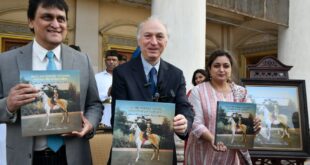by: Asad Mirza
The protests against the CAA started as soon as the news that the Bill has been given Presidential Assent became public. The first protestors were students, and within five days of the start of protests from Jamia, it spread to 22 campuses across India, medical and legal fraternity have also come out in protest against the CAA.
India is getting huge publicity. Negative? No worries. Any publicity is publicity. Newspapers across the world including The Wall Street Journal, New York Times, Washington Post, Guardian and Independent have covered the developing story on their front pages. Latest reports say that USCIRF (an independent, bipartisan U.S. federal government commission, the first of its kind in the world, dedicated to defending the universal right to freedom of religion or belief abroad) has recommended that if the CAB passes in both houses of parliament, the United States government should consider sanctions against the Home Minister and other principal leadership.
Before we examine the optics of the issue, let’s examine what lead to the spontaneous reaction of the public and what the change in citizenship actually means and whether we should be wary of CAA or the NRC?
The founding fathers of our constitution very clearly settled for jus solis (Birth in a territory) instead of jus sanguinis (blood-based inheritance) basis for granting Indian citizenship.
Even the recently hijacked icon of the BJP, the first home minister of India, Sardar Patel after a charged debate on the issue in the Constituent Assembly settled for a ‘jus soli’ approach to citizenship. He said, “It is not right for us to take a narrow view.” Patel again appreciated the constitution framers for an adopting an ‘enlightened modern civilised’ approach to citizenship, after the constitution was adopted.
Our constitution framers considered that the principle of equality before law, irrespective of one’s religion, race, sexuality and gender, was a necessary precondition for the functioning of a just society. Making religion a criterion for offering citizenship and excluding one religion from it was an insult to the legacy of this country’s freedom struggle, but now a nefarious attempt to institutionally single out Muslims and plunge them into unwarranted fear and insecurity is on.
Observance of handling of various issues by the government affecting the Muslims since it took power in May this year, leads one to believe that the CAA, along with many other previous decisions, is part of a larger design to make India a Hindu rashtra.
The CAA is in complete violation of Article 14, as our Constitution specifically prohibits any kind of discrimination on the basis of religion. When this issue of relative rights to minorities came up, B R Ambedkar vehemently rejected it saying, “I must deprecate any such idea. Rights of minorities should be absolute rights.” He added further “If we find that certain minorities in which we are interested and which are within the jurisdiction of another State have not got the same rights which we have given to minorities in our territory, it would be open, for the State to take up the matter in a diplomatic manner… But no matter what others do, I think we ought to do what is right in our own judgement”.
This distinction has served India well so far. But the CAA, coupled with the government’s claim that there will be a nationwide NRC, breaches this commitment to minorities irreparably.
Constitutional experts have already pointed out that if the NRC is implemented across the country then the plight of every citizen, be it Muslim or non-Muslim will be in peril, ultimately. First, the government will identify the ‘infiltrators’ as per its definition and then using CAA it will take action against those infiltrators. Thus, in fact the protests should be more against the NRC as that is the instrument, which will be used to identify the ‘infiltrators’ or non-Indians.
The government’s claim that it is concerned about “crores of people” belonging to religious minorities who are being persecuted for their faith in neighbouring countries seems completely flawed. First, why is it concerned about just three neighbouring countries ignoring the rest like Nepal, Sri Lanka and Myanmar? Secondly, why is it concerned about just five communities?, conveniently omitting the Muslims? The choice of three countries — Afghanistan, Bangladesh and Pakistan – is arbitrary. If the government is really concerned about persecuted minorities, then why not extend this gesture for the Tamils from Sri Lanka and Rohingya from Myanmar? Similarly, Hazaras in Afghanistan, and Ahmadiyyas, Shias and Balochs in Pakistan are also being persecuted. Why not do something about them too, since the government is trying to become the champion of the persecuted across south Asia?
The government’s vicious Brahmanical ideology is attacking the very foundation of Indian democracy. Government is not bothered about the economy, which is in doldrums with mass unemployment and inflation making lives miserable for ordinary people. Every Indian who cares for democracy, freedom, secularism and equality should come together to resist this assault on the idea of a humane, pluralist and egalitarian India.
Disclaimer: The views expressed herein are author’s own and do not necessarily reflect those of the organization / publication.
 Gawah (The Witness) – Hyderabad India Fearless By Birth, Pristine by Choice – First National Urdu Weekly From South India – Latest News, Breaking News, Special Stories, Interviews, Islamic, World, India, National News
Gawah (The Witness) – Hyderabad India Fearless By Birth, Pristine by Choice – First National Urdu Weekly From South India – Latest News, Breaking News, Special Stories, Interviews, Islamic, World, India, National News





